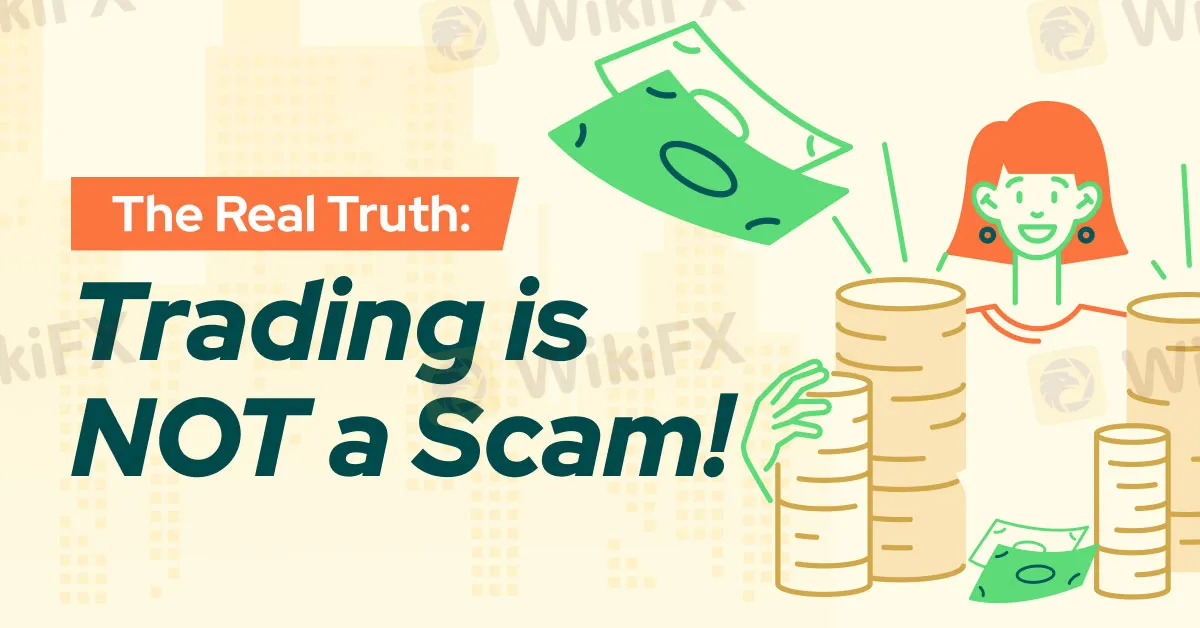简体中文
繁體中文
English
Pусский
日本語
ภาษาไทย
Tiếng Việt
Bahasa Indonesia
Español
हिन्दी
Filippiiniläinen
Français
Deutsch
Português
Türkçe
한국어
العربية
The Real Truth: Trading is NOT a Scam!
Abstract:In the dynamic world of financial markets, where opportunities abound, the notion of trading being a scam often arises, fuelled by misconceptions and unfortunate experiences. However, is this really the truth?

In the dynamic world of financial markets, where opportunities abound, the notion of trading being a scam often arises, fuelled by misconceptions and unfortunate experiences. It is imperative to dispel this myth and recognize that trading itself is not a scam; rather, it is the pitfalls of human behaviour – greed, fear, and lack of education – that can lead individuals astray.
Trading, when approached with diligence and a well-informed mindset, is a legitimate and potentially lucrative endeavour. However, the truth is that many individuals fall victim to scams or experience significant losses due to their own psychological and educational shortcomings.
The first step towards debunking the myth that trading is a scam involves understanding the inherent risks involved. Financial markets are volatile, influenced by a myriad of factors such as economic indicators, geopolitical events, and market sentiment. Lack of knowledge about these factors can lead to poor decision-making and financial losses.
It is crucial for traders to acknowledge that the market's unpredictability is not a scam but rather an inherent characteristic. Professional traders or full-time retail traders invest time in learning about market dynamics, technical and fundamental analysis, and risk management to navigate the uncertainties effectively.
One of the primary culprits behind the misconception that trading is a scam is human greed. The desire for quick and substantial profits can blind individuals to the risks involved, leading them to fall prey to fraudulent schemes or make impulsive, uninformed trades.

Successful traders recognize the importance of discipline and strategic decision-making. They approach trading with realistic expectations, understanding that consistent profitability is a result of a well-thought-out and disciplined trading plan, not a shortcut to overnight wealth.
On the flip side, fear can be equally detrimental to traders. Fear of losses or missing out on potential gains can trigger emotional responses that cloud judgment. Unchecked emotions often result in impulsive decisions, leading to significant financial setbacks.
Education plays a pivotal role in mitigating fear. Traders who invest time in understanding market dynamics, risk management, and developing a robust trading strategy are better equipped to make rational decisions, minimizing the impact of fear on their trading activities.
Perhaps the most significant contributor to the misconception of trading as a scam is the lack of education. Trading is a skill that requires continuous learning and adaptation to changing market conditions. Individuals who jump into trading without a solid understanding of market principles and strategies are setting themselves up for disappointment. Education empowers traders to make informed decisions, assess risk factors, and develop strategies tailored to their financial goals. Recognizing the importance of education is a crucial step in debunking the myth that trading is a scam.
In conclusion, the real truth is that trading is not a scam; rather, it is the human elements of greed, fear, and lack of education that can lead to unfavourable outcomes. Traders must approach the financial markets with a mindset focused on continuous learning, discipline, and strategic decision-making.
Acknowledging the risks, understanding market dynamics, and cultivating a disciplined approach are essential for long-term success in trading. The journey towards profitable trading begins with self-awareness, education, and a commitment to overcoming the psychological pitfalls that often lead to misconceptions about the legitimacy of trading as a financial pursuit.

WikiFX, a renowned platform in the forex industry, offers valuable resources and features to help traders navigate these challenges. By providing comprehensive broker assessments, including transparency ratings, regulatory information, and user reviews, WikiFX empowers traders to make informed decisions and avoid potential scams. Through educational content and market insights, WikiFX equips traders with the knowledge and tools necessary to understand market dynamics, manage risks effectively, and develop robust trading strategies. By leveraging the features offered by WikiFX, traders can approach the financial markets with confidence and overcome the misconceptions surrounding trading as a scam. Download yours now!

Disclaimer:
The views in this article only represent the author's personal views, and do not constitute investment advice on this platform. This platform does not guarantee the accuracy, completeness and timeliness of the information in the article, and will not be liable for any loss caused by the use of or reliance on the information in the article.
Read more

Navigating the Intersection of Forex Markets, AI Technology, and Fintech
The financial world is transforming, driven by the rapid integration of artificial intelligence (AI) and innovative fintech solutions. This change is most apparent in forex markets, where algorithmic trading and deep learning are redefining strategies, risk management, and decision-making. In this article, we explore how AI-driven technologies are not only revolutionizing forex trading but are also propelling fintech innovations that enhance customer experiences, bolster security, and unlock new market opportunities.

The One Fear That’s Costing You More Than Just Profits
The fear of missing out (FOMO) is NOT what you think it is! Read the three lesser-discussed components that contribute greatly to FOMO trading!

Why More People Are Trading Online Today?
Discover why online trading is booming with tech, AI, and a push for financial freedom. From stocks to crypto, it’s a thrilling hustle for all.

Bitpanda Secures Full Broker-Dealer License in Dubai
Bitpanda has officially obtained a full broker-dealer license from the Dubai Virtual Assets Regulatory Authority (VARA), marking a significant milestone in its international expansion. This approval, which follows preliminary authorization granted three months earlier, enables the European digital asset exchange to introduce its comprehensive suite of virtual asset services to investors in the United Arab Emirates (UAE).
WikiFX Broker
Latest News
Why Are Financial Firms Adopting Stablecoins to Enhance Services and Stability?
Experienced Forex Traders Usually Do This Before Making a Lot of Money
Octa vs XM:Face-Off: A Detailed Comparison
When High Returns Go Wrong: How a Finance Manager Lost RM364,000
Bridging Trust, Exploring Best—WikiEXPO Hong Kong 2025 Wraps Up Spectacularly
Interactive Brokers Expands Crypto Trading with Solana, XRP, Cardano, and Dogecoin
Fidelity Investments Explores Stablecoin Innovation in Digital Assets Sector
Why More People Are Trading Online Today?
SEC Ends Crypto.com Probe, No Action Taken by Regulator
Broker Comparison: FXTM vs XM
Currency Calculator







